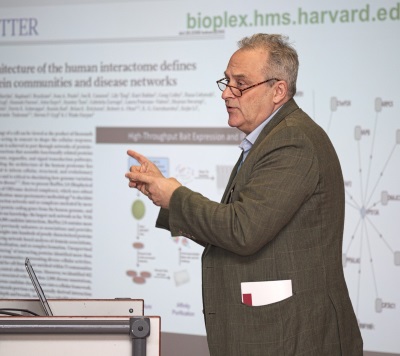NA PEOPLE: Adrian Danek: Global Communication
 |
 As our capacities for endurance, obedience and compassion continue to be challenged by the corona pandemic, one of its rare positive side-effects is experienced by almost everyone. Video conferencing has introduced new ways to communicate in science (see last newsletter) and the novel format has been used for the 10th NA symposium in March. As video conferences are increasingly popular also in less formal settings and the technical preconditions are widely available, it came naturally to use one of the evenings that are otherwise spent for festive December gatherings but were now freed for a virtual end of the year neuroacanthocytosis meeting. As our capacities for endurance, obedience and compassion continue to be challenged by the corona pandemic, one of its rare positive side-effects is experienced by almost everyone. Video conferencing has introduced new ways to communicate in science (see last newsletter) and the novel format has been used for the 10th NA symposium in March. As video conferences are increasingly popular also in less formal settings and the technical preconditions are widely available, it came naturally to use one of the evenings that are otherwise spent for festive December gatherings but were now freed for a virtual end of the year neuroacanthocytosis meeting.
Out of our global community approximately 50 patients, carers, medical people and scientists met virtually for two hours on December 7. Participants were from at least twelve countries, spanning at least 10 time zones. In spite of absent “Glühwein”, cookies, and the like, a convivial atmosphere of informal exchange and camaraderie developed. An initial introductory round informed the participants about the developments of the US NA advocacy. Further topics ranged from the announcement of acquisition of funding for the virtual meeting by the Barcelona group (congratulations!) to the current state of availability of Western blot testing and of work on the patient registry. Recent basic science developments were explained by Ody Sibon (Groningen), Liz Conibear (Vancouver) and we experienced a lab visit as we virtually accompanied Aaron Nieman (Stony Brook) looking after his yeast cultures.
The meeting was felt so useful that it was almost immediately followed up (January 18), this time devoted to medical questions and answers. It is obvious that these formats need to be continued and developed further. Medical Q&A meetings held in languages other than English would be natural sequels, but also regular scientific mini-symposia must be considered. The novel formats were unexpectedly forced upon us but for ultra-rare diseases they have the potential to further overcome patient isolation and science fragmentation by live interaction on a truly global level.
A second Forum was held on 5 July with the discussion of McLeod Syndrome. Future dates are: 27 September when Ruth Walker will lead the group on the topic of Neuropathology and 31 January 2022 with Kevin Peikert, “proteins & scramblases”.
 |
|